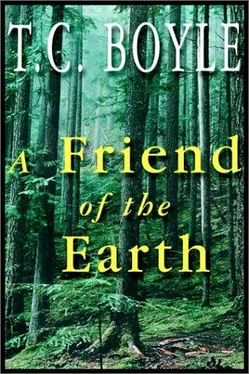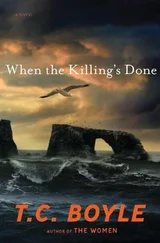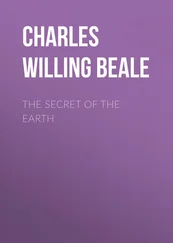"Well, it must have heard my father — or the soft wet thwap of the cheese hitting the pavement — and it turned, sniffed and vacuumed up the cheese, wax paper and all, and then it ambled up to the car, swinging its head to catch the scent, and it was like two huge dogs wrapped in an old rug. I remember the smell of it-still, and after all these years and all the animals I've tracked and shot and skinned. It was rank and wild and it engulfed U. S as if the car had suddenly rolled down a hill and into a swamp or a cesspool, and it made me afraid, but only momentarily, and not so afraid I didn't hang out the window and feed it a whole bag of popcorn, kernel by kernel, and the marshmallows we were going to roast over the fire that night.
"By this time, people were getting out of their cars all up and down the line, so many people you could hardly see the bears for them. They all had cameras, and some of them were offering the bears more elaborate things, like hot dogs on a stick and jars of peanut butter-one guy even held out a pineapple to a bear, and though I'm sure the bear had no idea what it was, it ate it, prickly skin and all. That was when my father closed in on our bear — the black one with the melted eyes, a thing that barely came up to his waist — and decided he wanted a picture with one of us kids mounted on the thing's back."
"You've got to be kidding," Tierwater said. Sierra darted a glance out the window. She was hunched over her plate, rhythmically knocking her knees. She didn't say a word.
Ratchiss just shook his head. "I was too big, obviously, so he got my mother to hold the camera and he lifted my sister up into the air, thinking to swing her over the bear's shoulders for just an instant as it nosed at the popcorn on the pavement. My sister was wearing a white dress, with pink roses on it, that's what the pictures show, and a ribbon, I remember a ribbon." He pushed back from the table, drew on his cigarette and let out a long slow exhalation. "And that was it. My father was six months in the hospital. My sister, what was left of her, we had to bury."
Andrea leaned forward, both hands cupped over the rim of her wineglass. "You must have been devastated-"
"I saw the whole thing, my mother screaming, my father wrestling with this snarling bolt of stinking primitive energy, my sister, and I didn't do a thing, nothing, just stood there… It took me half my life, looking at my father's disfigured face and the looping white scars down his back every time we went to the beach or the pool, to understand that it wasn't the bear's fault."
"She died?" Sierra said, but nobody answered her.
After a suitable pause, during which Ratchiss stared down at the juices congealing on his plate and they all took a moment to listen to the silence of the woods brooding over the house, the conversation moved on to other things. There was coffee, and hot chocolate for Sierra, and then they retired to the big room to throw a log on the fire and sit watching the flames chew away at it. At some point, Andrea and Ratchiss talking in low tones about gut-shot buffalo and wild dogs, Tierwater poking through Emerson and Sierra hunched in the corner over a magazine, the telephone rang — but it didn't just ring; dropped into that well of silence, it was like an explosion. On the first ring, Tierwater felt as if he'd been hit in the back of the head with a hammer; on the second, he wanted to leap up and tear the cord from the wall. He was jumpy, and who wouldn't be? They could come for him at any moment.
Ratchiss answered it. "Yeah," he said. "Oh, hi. Just talking about you. Uh-huh, uh-huh." He cupped a hand over the mouthpiece. "It's Teo, calling from a phone booth. Change of plans-he'll be up tomorrow. He wants to know if you want anything-"
Tierwater just shook his head, but Sierra rose out of her seat and threw down the magazine. "Tell him I want magazines, books, video games, anything," she said, advancing on Ratchiss as if to snatch the phone away from him. "Tell him I want friends. Tell him I'm bored, bored, bored-"
"Yeah," Ratchiss whispered into the phone. "Uh-huh, yeah." Then he put his hand over the receiver again and gently replaced it in its cradle.
Sierra was left standing in the middle of the room, her hands spread in extenuation. She was grimacing, and Tier-water could see the light glint off her braces — and that was another thing, an orthodontist, and how was he going to explain the fact that somebody had twisted those wires over her teeth and kept meticulous records of it but that that somebody's name and records were unavailable? "I mean it," she said, and he thought she was going to start stamping her foot the way she did when she was three. "I don't want to be trapped up here with a bunch of old people and hicks, and I don't want to be Sarah Drinkwater either — I want to be me, Sierra, and I want" — her voice cracked- "I want to go home."
"You see this?" Teo was standing at the edge of a dirt road deep in the woods, hands on his hips. He gestured with a jerk of his chin "This is a culvert, twelve-inch pipe, nice and neat, keeps the creek from flooding out the road at snowmelt. If they don't have a culvert they don't have a road, and if they don't have a road they can't get the logs out."
It was a day of high cloud and benevolent sun, a Saturday, and the trees stood silent around them. They weren't real trees, though-not to Tierwater's mind, anyway. They weren't the yellow pines, the Jeffreys, ponderosas, cedars and sequoias that should have been here, but artificial trees, hybrids engineered for rapid and unbending growth and a moderate branching pattern. Neat rows of them fanned out along both sides of the road, as rectilinear as rows of corn in the Midwest, interrupted only by the naked rotting stumps of the giants that had been sacrificed for them. Tree fanning, that's what it was, tree farming in the national forest, monoculture, and to hell with diversity. Tierwater didn't see the long green needles catching the sun, didn't smell the pine sap or think of carbon-dioxide conversion or the Steller's jay squawking in the distance-he just gazed with disgust on the heaps of frayed yellow underbranches the timber company had pruned to make the job of harvesting all the easier. There was even a sign down the road — a sign in the middle of the forest, no less-that read Penny Pines Plantation. It was no better than graffiti.
One night, against his better judgment, he'd gotten into a debate with a logger at the local bar, an old man so wizened and bent over you wouldn't have thought he'd be able to lift a saw, let alone handle it, but as it turned out, he was a trimmer, part of the crew that shears the branches off the trees once they've been felled. Tierwater had said something about clear-cutting, and the old man, who was sitting at the bar with two cronies in plaid shirts and workboots, took exception to it. "Let me ask you this," he said, leaning into the bar and fixing Tierwater with a stone-cold crazy look, "you live in a house or a cave? Uh-huh. And what's it made out of? That's right. You use paper too, don't you, you got some kind of job where you don't get your hands dirty, am I right? Well, I'm the one that give you the paper in your nice clean office, and I'm the one that cut the boards for your house — and if I didn't you'd be living in a teepee someplace and wiping your ass with redwood bark and aspen leaves, now, wouldn't you?"
Tierwater had felt something rise up in him, something born of impatience, truculence, violence, but he suppressed it-he was trying to keep a low profile here, after all. There weren't more than fifty cabins out there in the woods, with a couple of blacktop roads connecting them to the combination lodge, gift shop, bar and restaurant he was now sitting in, and everybody knew everybody in Big Timber. So he just turned his back, picked up his beer and went off to sit at a table in the corner. He'd felt bad about that, about letting the running dogs of progress have the last say, but now, out here under the sky, in the midst of their plantation, he saw a way to answer them all.
Читать дальше












